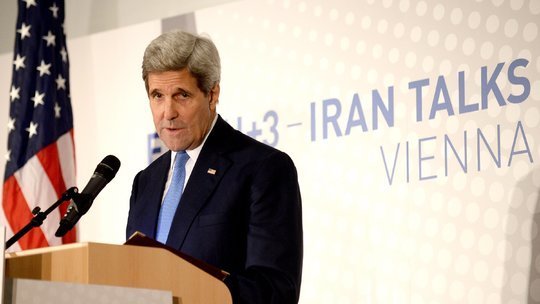Iran nuclear issue: will there be another opportunity?
- By Jin Liangxiang
 0 Comment(s)
0 Comment(s) Print
Print E-mail China.org.cn, November 27, 2014
E-mail China.org.cn, November 27, 2014
The parties at the Iran nuclear talks finally declared an extension of seven months, close to the Nov. 24 deadline. Though the parties expressed optimism for the final outcome, a postponement does not necessarily mean more opportunities. Judging by the changing domestic politics of the United States and Iran, it will become more and more difficult to reach a deal.
|
|
|
The U.S. Secretary of State John Kerry said officials have given themselves seven more months to reach an accord with Iran on its nuclear program, and that the talks had made “real and substantial progress.” |
The last year witnessed the most peaceful period of the Iran nuclear issue ever since it became a hotspot. On Nov. 24, 2013, the parties reached the Joint Plan of Actions (JPOA), also dubbed the interim agreement, which was regarded as the first major substantial achievement by the parties regarding the Iran nuclear issue since moderate Hassan Rouhani was elected president of the Islamic Republic of Iran.
The parties have also been honoring their commitments in the JPOA. Iran suspended its efforts to produce uranium beyond 5 percent purity, diluted half of its stockpile of uranium produced at 20 percent purity to 5 percent, and answered a number of questions raised by the IAEA. The United States de-froze some of Iran's overseas assets, and removed sanctions on Iran's international trade in chemicals, metals and aircraft parts.
It is true that gaps were not meaningfully narrowed in the size of Iran's uranium enrichment capabilities, the process for removing sanctions and the duration of the agreement, which finally resulted in missing the deadline of Nov. 24, 2014. But fortunately, the confidence of the parties is still there. And Iran's serious negotiation position is acknowledged and appreciated by parties.
However, despite favorable trends, 2015 will likely be another difficult year for the nuclear issue. Domestic politics can always have a negative effect on the Iran nuclear issue. The oppositions for rapprochement between the two are strong both in the United States and Iran, though they both have communities expecting for better relations between the two.
American hostility toward Iran is rooted in various sources. The nightmare of the hostage crisis of 1979 provided an example of how time is powerless in diluting the traumatic memories. Despite the passage of time, Americans still keep it in memory. In 2013, the Hollywood movie "Argo," based on the hostage crisis, won several big awards; in 2014, the United States refused to approve a visa application for Hamid Aboutalebi, who was designated Iran's new envoy to the UN. The U.S. media reported that Hamid participated in kidnapping the hostages.






